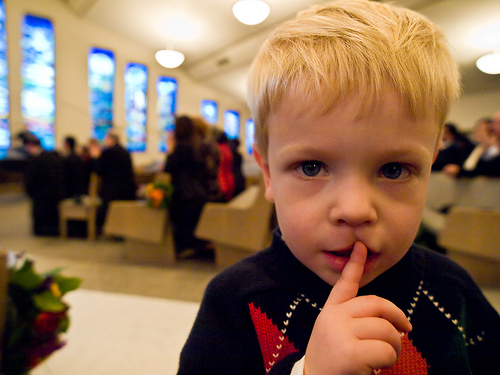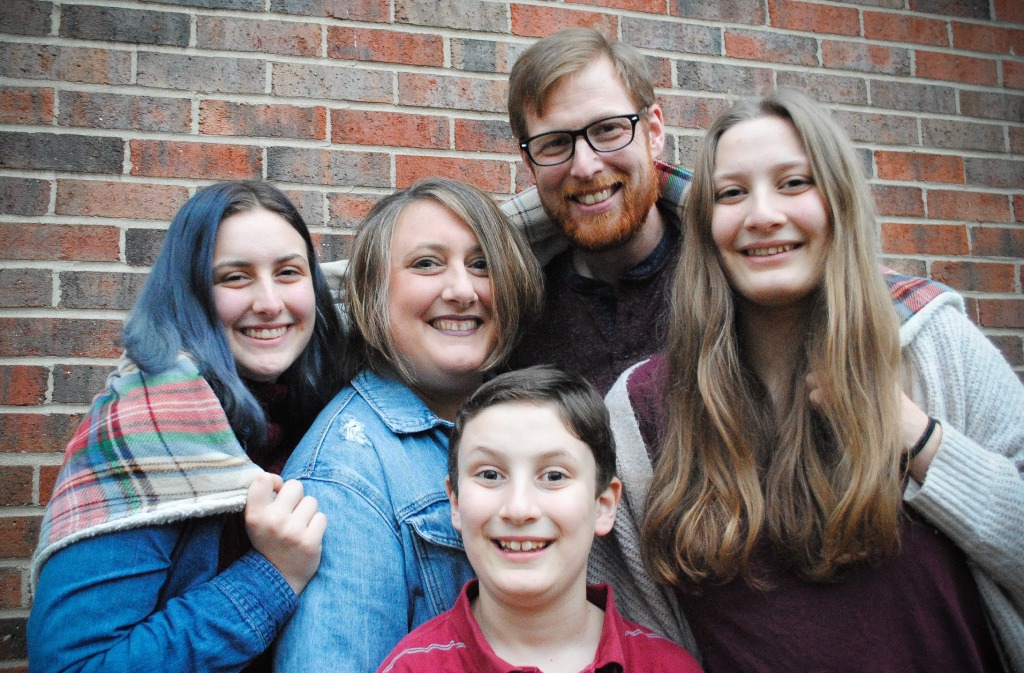In a recent conversation with some colleagues in ministry, someone used the terminology “hospitality between generations” and I was captured by that idea. Hospitality is this idea of not only welcoming someone into a space but intentionally going out of one’s way to ensure they are wanted there; that they belong.
Our church has been studying the book of Hebrews and at the end of this very long, very theological book, the author writes, “Keep on loving one another as brothers and sisters. Do not forget to show hospitality to strangers, for by so doing some people have shown hospitality to angels without knowing it”.
There’s something holy about hospitality. It’s more than nice tablecloths and special food for company. It’s a space of embrace and integration, of true community and belonging.
When thinking about hospitality between generations, one might imagine space being made in areas that are traditionally focused on one age group or life experience. And typically, whenever we talk about including all ages in these spaces, one of the concerns that gets raised is whether or not developmental needs of all ages are being met in that context. Often this is specifically used to reference the inclusion of children in the larger worship context.
But sometimes this view is based on a narrowly defined area of developmental research and theories and a wider look at developmental psychology can give us a broader view of what it means for something to be “developmentally appropriate.”
Like most research, developmental theories are just that – theories. Lots of research continues to be done in early childhood development. Most people only think about cognitive development as the ability to understand certain things like words in a sermon or abstract concepts like worship. However, if we are looking at basics of development, it’s helpful to think bigger than that.
Development not just about what children or adults can understand in terms of words and concepts; it’s about what they can learn socially, emotionally and in our case, spiritually.
Here are a few research-based reasons that support the inclusion of all ages, including younger children all the way through older adults, in times of corporate worship and intergenerational learning.
- Vygotsky’s Zone of Proximal Development– This developmental theory explains that young children need to be in close proximity to older people who have “mastered” the tasks that they are learning. For instance, a four-year old is going to learn how to stack blocks better when playing with a 6 year old who has mastered the trick.
When we are talking about church, these young children learn what church is, how to act, what is expected by being in close proximity to adults who are practicing especially their parents who hold the most influence on their children’s spiritual lives. Here’s a great article about the power of the Zone of Proximal Development.
Conversely, Jesus himself tells us that adults can learn the most about the kingdom of God by observing and imitating a child (Matthew 18:1-4). We genuinely need each other in order to grow physically and spiritually.
- Observational learning is another powerful developmental tool for young children. Watching others model what they should do is an important part of social development and one that has been lacking to in the larger church. This is often why when youth “graduate” from youth group, they don’t know how to interact socially with the larger church body and often end up leaving the church and saying they don’t feel like they belong.
Creating opportunities for observational learning can be tricky if a church is structured in a way characterized by all ages being separated from one another. The key is to create spaces where generational interaction can take place. For some practical tips and ideas for creating spaces where generations can connect together in worship and discipleship, check out this article.
- Fowler’s theory of Faith Development – Probably the best known developmental work in the area of faith comes from James Fowler and is based heavily on the work of Piaget, Erikson and Kohlberg (Check out the book The Church of All Ages by Howard Vanderwell, Chapter 3 for much more on this).
In Fowler’s first stage (preschool aged children up to age 6) called the Intuitive-Projective faith stage, children basically reflect the spirituality of their parents. Children will build their first ideas about their faith from the impressions of what they see and hear in church.
The second stage (age 6-11) is called the Mythic-Literal stage where kids begin to learn the stories of the faith and articulate their own beliefs. That belief is largely mitigated by information they get from others and parents begin to share their influence with the rest of the church family. Framing sermons with a biblical story is a perfect way to invite this age into the sermon.
Other noted developmental ideas come from the work of Jean Piaget whose first two stages of development put a high premium on the importance of language combined with sensorimotor exploration. This is why sensory bags or activity bags during services can be such a powerful tool for helping children engage during worship time.
Note: Activity bags get a bad rap, mostly because people don’t understand the developmental science behind them. It’s important to understand that these activities aren’t intended to distract the kids but rather to help the kids use all of their developing senses; studies show if their hands and eyes are busy, their ears will be listening. Quiet activities like lacing cards, stickers scenes, foam craft kits, beads and pipe cleaners, small puzzles and coloring are all great ways to engage your kinesthetic and visual learners.
The truth is if we look at the broad spectrum of developmental theories including these and others not mentioned here like Erikson’s stages of psychosocial development or Kohlberg’s stages of moral development, we can find space in all of them for including all ages in contexts of intergenerational worship and ministry. Because ultimately, as social creatures, humans learn best from one another regardless of age. That means developmental appropriateness is something we can incorporate into any setting where we connect with other, especially others at different stages of development than we are.
Does that mean we shouldn’t have age-sensitive spaces?
No, not at all. There are lots of other developmental reasons to have spaces that meet our unique developmental needs. For instance, the ability to think abstractly is a characteristic of higher levels of development; until then, concrete thought is our primary means of processing. So we should have places where concrete access to learning is granted.
The truth is that worship services where all generations interact and connect can be developmentally appropriate if we are willing to broaden our understanding and find ways to build on the developmental stages we all find ourselves in. We have to become hospitable
That would also mean we would craft environments that aren’t targeted to a couple of generations but we would take the time to ensure each member in attendance would be able to participate in developmentally appropriate ways. We would need to welcome the stranger and find ways to embrace the community. And in that way, we can even more fully explore what it means to experience hospitality between generations.
An earlier version of this article was published here in July 2019
It’s Time To ReFocus
Are you interested in moving your church from a traditional, age-segregated into a more family-focused, intergenerational focus, connecting the home and the church?
Refocus Ministry would be happy to begin a conversation with your team and church about the how your church can grow in serving the families of your church and community and connecting your faith community in relationship with each other.
Ongoing coaching through various means is also available as your church continues the transition including weekly emails, monthly on-line trainings, and continued conversations. In addition to one-on-one coaching calls and follow-up resources, the following large-group presentations can be made available to your team, pastoral staff, or congregation.
Options to choose from for these presentations include:
- Presenting on a Sunday morning to your worship service(s)
- A parent webinar on Everyday Discipleship and partnering with the church community
- A presentation on Connecting Generations (importance, need, Biblical foundation) for your leadership team
- A training on a specific area of ministry such as Family VBS, Partnering with Parents, Equipping Volunteers, Creating an Intergenerational Culture for your ministry or leadership team.
- OTHER – We will work to create a presentation that best suits your community’s needs
Use the contact form below to receive a customized quote for your congregations needs. We look forward to journeying with you to make Psalm 145, one generation to another, part of our church’s DNA.
For more information about…
- Kids in Worship
- Determining which Type of Family Ministry model works best for your church
- Discipleship in Intergenerational community
- Encouraging the continued conversation through Practical Discipleship at Home
- Seminars, Workshops, Coaching
Check out to ReFocus Ministry or “like” our Facebook page. Join our conversation at theReFocus Family and Intergen Ministry group on Facebook.
About ReFocus
Refocus Ministry was started by Christina Embree who serves as the Minister of Generational Discipleship with the Great Lakes Conference of the Brethren in Christ. She is also wife to Pastor Luke, mom to three wonderful kids, and pastor at Plowshares BIC.
With years of experience in family ministry and children’s ministry, she is passionate about seeing churches partnering with families to encourage faith formation at home and equipping parents to disciple their kids in the faith. She holds a Masters of Arts in Ministry focusing on Family, Youth and Children’s Ministry and is completing a Doctorate of Ministry in Spiritual Formation at Wesley Seminary, she also blogs at www.refocusministry.org and is a contributing blogger at D6 Family, ChurchLeaders.com, and Seedbed.
The advertisements on this page are chose by the web host and do not necessarily reflect the views of ReFocus Ministry.





1 Comment